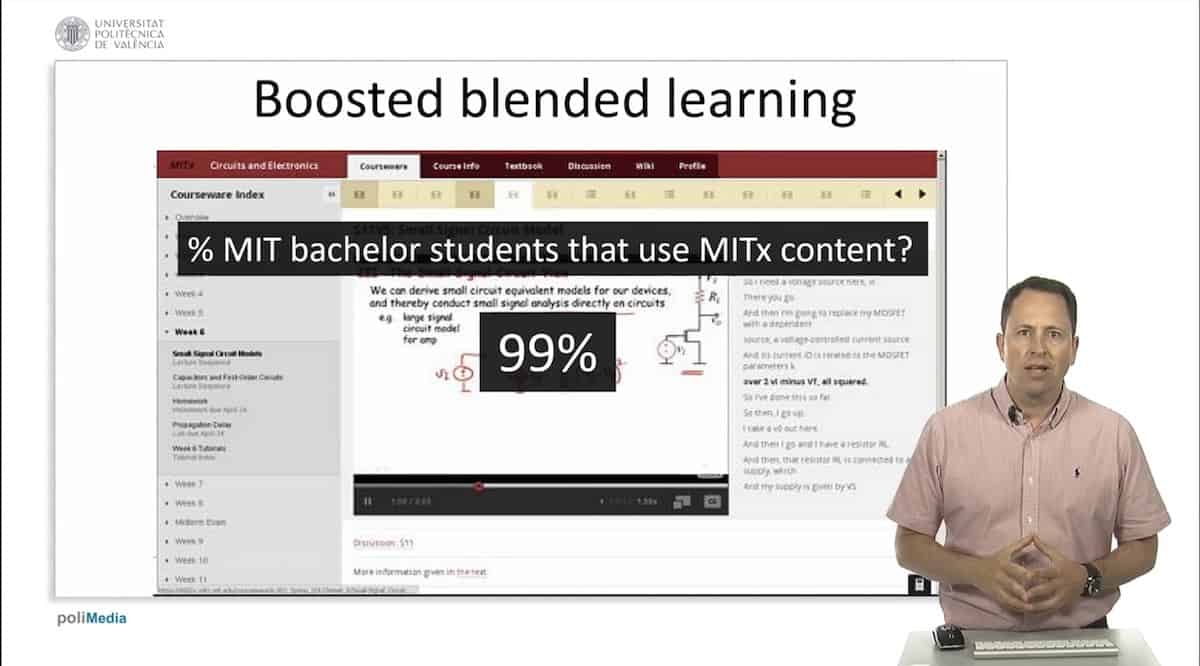Are MOOCs Going to Disappear? 4 Challenges to Overcome
Despite being an ardent supporter of MOOCs, Professor Ignacio Despujol of the Universitat Politecnica de Valencia also acknowledges that MOOCs face significant challenges.
Ignacio Despujol knows MOOCs. In addition to coordinating the MOOC initiative at the Universitat Politecnica de Valencia (UPV), which boasts 72 courses and over 1.5 million enrollments, he personally serves as the instructor of twelve MOOCs. Despujol also teaches an on-campus course that uses MOOC content in a flipped classroom model. Yet despite being an ardent supporter of MOOCs and the positive changes they can bring to higher education, Despujol acknowledges that MOOCs do face significant challenges if they are going to become a permanent feature in the higher education landscape. Earlier this year at Learning with MOOCs Conference in Madrid, Despujol gave a talk titled “Are MOOCs Going to Disappear? MOOC Challenges In the Coming Years.” In that talk, he highlighted four key challenges that MOOCs face.
Challenge #1: Completion rates
Much has been made of MOOCs’ famously low completion rates, which hover around 2 to 4%. However, Despujol says, these numbers need to be put into perspective. Looking at one of UPV’s first courses on edX, almost 200,000 learners enrolled, of whom only 7.5% passed the course. Digging deeper into the data, one learns that only around 34% of the enrolled learners ever accessed any of the course materials. The barriers to entry for a MOOC are so low that many people who sign up are merely curious and aren’t intending to actually complete the course. For the course in question, when you consider only those learners who took the first exam, more than 44% of them passed the course, a much different completion rate than the 7.5% headline figure. We should consider the learners’ motivations and redefine success accordingly, says Despujol. “Even the ones that are not finishing the courses are getting some education, and a percentage of them are achieving the goals that they had when joining the MOOC,” he notes.
Challenge #2: Accountability and Accreditation
Another challenge to MOOCs reaching the mainstream has to do with accountability. It is difficult in an online environment to assure that cheating isn’t happening. The risk of cheating goes up when courses become more valuable to learners, either because they result in university credit or because employers use them when making hiring decisions. However, these kinds of incentives are precisely what are required to ensure that MOOCs remain on the scene long term. To solve the problem of cheating, Despujol suggests a variety of technology-based solutions, including remote proctoring by humans, and even using the student’s computer microphone and camera to make random recordings during exams. Some of these solution are already in use on the major MOOC platforms.
Challenge #3: Accessibility
A third challenge has to do with who is currently benefiting from MOOCs. Despujol stresses that MOOCs ought to be used to close the digital divide, rather than enlarge it. In UPV’s MOOCs, 74% of learners already possess some sort of university education. According to Despujol, the main impediment to reaching those who don’t already have access to university education has little to do with access to technology. Rather, it is a lack of awareness that free and low-cost courses exist. “If you go now to the street and ask people if they know what is a MOOC they will answer that they don’t.” The solution, says Despujol, is simply to raise awareness. “We have to partner with the key agents in each community that know how to reach its members and spread the word about this wonderful opportunity.”
Challenge #4: Financial Sustainability
Of course, when it comes to challenges MOOCs face, the 800-pound gorilla in the room is financial sustainability. The greatest threat to the continued existence of MOOCs is the significant cost of creating great courses, and the low likelihood that those expenses will be paid back quickly, at least under current revenue models. To address this problem, Despujol has a few suggestions. MOOC platforms can develop new revenue streams, for example by offering learning solutions to corporations. They can also charge more for professionally oriented courses and use these to subsidize their other offerings. Working on the other side of the equation, universities can use various techniques to lower the cost of production for creating new MOOCs. By automating the MOOC production process and training teachers to be effective MOOC creators, Despujol’s team at UPV is able to quickly and affordably produce new MOOCs, even with a small staff.
Finally, if all else fails, governments can kick in the difference. Despujol notes that some governments are already supporting MOOCs through the creation and financing of national MOOC platforms, such as France’s FUN platform and Israel’s Campus-Il. Says Despujol, “Governments should start putting money in MOOCs if they want to keep them free.”
Professor Ignacio Despujol’s full talk, “Are MOOCs Going to Disappear? MOOC Challenges In the Coming Years,” is below:








Bondo
I am a Kenyan national. I discovered MOOC courses by chance some three years ago when I was browsing. I got convinced that the courses are credible because of the universities that sponsored or developed them.
I have introduced some of my students and discussed with my colleagues about these MOOCs. None has enrolled because they don’t believe that an online course can be recognized.
I have found very good courses from universities that I have always admired in my life. My biggest challenge is internet connection and if available then it’s speed.
There are some universities that charge a small fee, but being that our currency is weak, it is still expensive. However, MOOC is a good means to close bogus universities since it opens competition fronts.
T
MOOC’s as a permanent, integral part of higher education might be the dumbest thing I’ve read all month.
Mat
Why? We do not force students to sit in a library to read a textbook, they can do this at home. Why should we force students to sit on lectures when they can watch them online at home?
Roy Schweiker
COMPLETION RATES – for most MOOC today, you can’t get access to the full syllabus and requirements until you enroll. Sometimes I find that I don’t have the correct hardware/software or don’t want to do the necessary type of assignments so I immediately disenroll but this presumably counts as a non-completion. Or a journalist writing about the course has to sign up to get information. Providing this info upfront would aid completion rates.
ACCOUNTABILITY – as someone who has completed both several dozen traditional college courses and several dozen MOOC, a good MOOC is unmatched for learning ability due to ability to either fast-forward or skip lectures and 24-hour access to discussion forums on a busy course. However I have never yet signed up for a “verified” certificate because I fear that technical difficulties would mark me as a cheater as the same time as genuine cheating makes such a credential relatively worthless. {I have donated several thousand dollars to non-profit MOOC providers.) One provider of online certification exams suggests that hiring companies can proctor exams of candidates and there are for-profit testing centers if the hirer lacks the ability.
Karl
I truly hope that MOOC’s persist and their quality, variety, and availability continue to increase. However, point #2 seems to talk exclusively about accountability and makes no mention of accreditation. This is probably the primary reason I would not use MOOC’s to acquire an advanced degree. The recognition of a program by a well known and trusted accreditation body (in the USA Middle States Association of Colleges and Schools, New England Association of Schools and Colleges, etc.) would be necessary to validate the minimum quality of the degree program.
metarhyme
Counseling. What do individuals want to become familiar with. Is their hope somewhat reasonable. So, outreach – apparent interest shown in the person. Real help. Word of mouth would kick in – enhanced completion rates and certifications bought. System entrance probing questions and skill assessment. Guidance.
David K
The reason they will disappear is simply that completion is worthless (economically) in the real world in comparison to real universities. A diploma and accredited transcripts (and professional experience) seem to be all that matters in obtaining a job, and if you’re trying to move ahead in a company you’re already employed at, the knowledge alone is all that matters. So in what sense do they make sense? Knowing that, I’ve signed up for many simply to access the materials – with no intention on officially “completing” them.
Günther
I absolutely agree! MOOCs are a great way of gaining new knowledge but the (paid) certificates of completion are worthless.
Robert
I have read dozens if not hundreds of articles about Google, Microsoft, Facebook, Apple, Amazon complaining about lack of tech literate workers. They are worth several $TRILLION collectively, but they don’t want to toss 0.0001 of their revenues towards educating people to fill the tech gap in education.
Something seems wrong with that picture.
Ronny De Winter
Challenge #1: Completion rates
The rate is the wrong challenge, it is the absolute number that counts:
If 7.5% of 200,000 learners enrolled pass the course, that means 15,000 people passed. How much would it cost to reach that goal with a classical college education?
Challenge #2: Accountability
Accountability has to be built by the teaching institute and instructors. The ultimate test is for the learner to apply what he has learned in real work. Proctor or any other form of exam won’t make much difference. The only goal of an exam is a self-test to gain self-confidence in the material. People will succeed in their careers because they are motivated and challenged to perform, with the help of what they learned in courses. Certificates won’t help much. Cheaters will lose in the end.
Course reviews from students on Class Central might become a better measure for accountability than proctored exams and certificates.
Challenge #3: Accessibility
MOOCs have the potential to both close the digital divide, and to enlarge it further. Our ever more complex world will automatically result in a bigger digital divide. MOOCs will only enable society to delay this evolution, but not stop or retrofit it. Continuous attention is needed on finding the right balance and investing enough in developing regions.
Challenge #4: Financial Sustainability
MOOCs are still in their infancy. In their short lifespan, they created disruption by providing educational opportunities that were not possible before. These disruptive technologies, their economies of scale, and further reduction of production costs will surely result in sustainable business models for many organizations. MOOCs will not disappear!
And I am sure governments and corporations will kick in the difference. Education has been proved to be the best catalyst for future well-being and prosperity. With MOOCs this education can be delivered to a larger audience than ever before and at a lower cost.